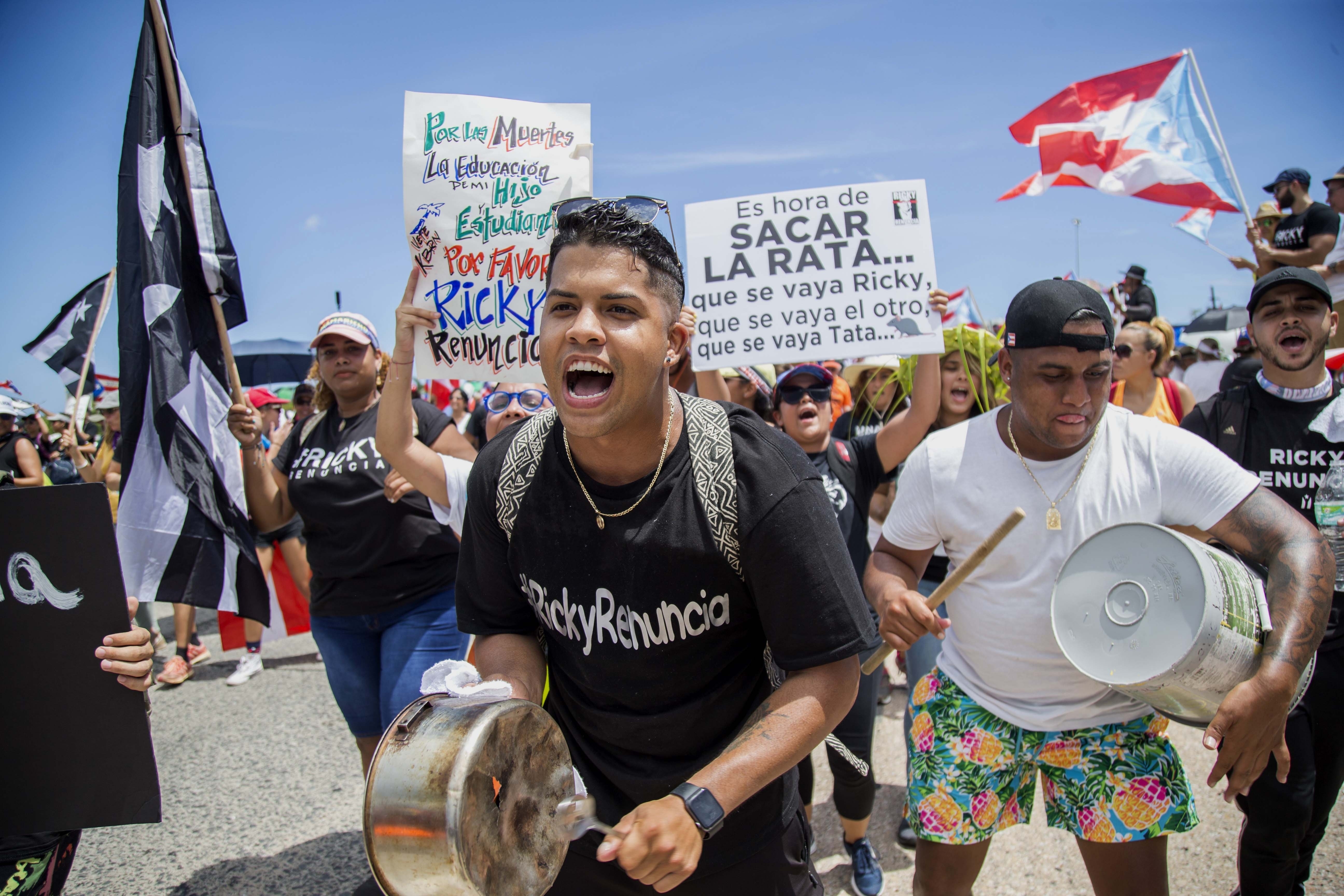Truthdiggers of the Month: Puerto Ricans Who Toppled a Corrupt Governor
As one protester said, “We are writing our own story.” Demonstrators bang on pots and buckets as they march on Las Americas highway demanding the resignation of governor Ricardo Rossello, in San Juan, Puerto Rico. (Dennis M. Rivera Pichardo / AP)
Demonstrators bang on pots and buckets as they march on Las Americas highway demanding the resignation of governor Ricardo Rossello, in San Juan, Puerto Rico. (Dennis M. Rivera Pichardo / AP)
When Ricardo Rosselló, soon to be the former governor of Puerto Rico, stepped off a plane in San Juan on July 11, nearly 100 people were waiting for him. They were neither fans nor supporters, but members of multiple activist groups chanting “Ricky Renuncia”—a demand for him to resign.
The protest was organized by the feminist group Colectiva Feminista en Construcción after Puerto Rico’s Center for Investigative Journalism published almost 900 pages of leaked chats and messages between the governor, his top aides and cabinet members. The chats were filled with homophobic, misogynistic and threatening comments directed at politicians, celebrities and members of the media.
As Colectiva Feminista member Shariana Ferrer told The New York Times, “We went to the airport so that he would see the country that he was coming back to. This wasn’t just about words. This wasn’t because they called us whores. This was a governor who abused his power.”
What started as a small demonstration at an airport morphed into a series of massive protests, possibly the biggest in the island’s history. Within two weeks, pressured by the protests, the governor agreed to resign.
Ed Morales, writing in The Nation, highlighted another coalition involved in coordinating the mass protests, Victoria Ciudadana, whose membership includes former gubernatorial candidates. Morales, however, stresses that this was a movement of all Puerto Ricans, not just longtime activists.
What makes the Puerto Rican protests so inspiring, aside from their sheer scale and sustained action, is their clear, specific goal of the governor’s resignation, and the diversity of tactics used to accomplish it. Within eleven days, nearly the entire island went on strike.
As Lilliam Rivera wrote in The Washington Post, demonstrations were held involving yoga, live readings of the leaked messaging, and, in the great tradition of Latin American protests, a cacerolazo (people banging pots, pans, and utensils) occurred every night. Rivera, who is originally from Puerto Rico, believes Americans can learn from the protests, writing, “This isn’t an isolated incident happening on our island. It is a blueprint that can easily be translated here in the States—the spark needed to ignite change.”
There were songs and dancing and support from celebrities like pop singer Ricky Martin and reggaeton star Bad Bunny, as well as former MLB player Carlos Delgado and a host of others. Bad Bunny and rapper Residente recorded a protest song, “Afilando los Cuchillos” (Sharpening The Knives).
“We’re writing history,” Juan Carlos Rivera Ramos, an activist, told Morales. “Our people, in all their diversity of colors and flavors, ideological plurality, are expressing dignity on the streets. My eyes are tearing.”
While the feminist group may have organized the airport demonstration, Ferrer maintains the protests were a collective action. “Nobody can claim credit for this moment, because there are no leaders in this movement. This is an organic movement,” she explained to the Times.
She was adamant that even if the leaked chats and prior arrests of two government officials by the FBI were the immediate spark for the mass protests, they reflected years of anger and organizing. “It’s not spontaneous,” Ferrer told the Times. “This is the culmination of years of grass-roots work, community work, and social political organizations.”
Activists are continuing that work as Rosselló’s term ends. With Puerto Rico’s future leadership still uncertain, and no replacement for governor yet, protests continue. Customarily, the Secretary of State would be the next in line, but Luis G. Rivera Marín, who last held that position, resigned following the chat scandal. Justice Secretary Wanda Vázquez is in line after him, but has turned down the governorship.
Alexandra-Marie Figueroa Miranda, a campaign and activism coordinator at Amnesty International in Puerto Rico, told NBC News, “We’re at a strange moment because there’s no clear sense of what comes next. There’s a panorama of uncertainty.”
Puerto Ricans may be skeptical, but that hasn’t stopped them from fighting. For their sheer commitment and energy, and for weeks of sustained protests that their mainland counterparts could easily learn from, the Puerto Rican protesters are our Truthdiggers of the Month.
Your support matters…Independent journalism is under threat and overshadowed by heavily funded mainstream media.
You can help level the playing field. Become a member.
Your tax-deductible contribution keeps us digging beneath the headlines to give you thought-provoking, investigative reporting and analysis that unearths what's really happening- without compromise.
Give today to support our courageous, independent journalists.








You need to be a supporter to comment.
There are currently no responses to this article.
Be the first to respond.